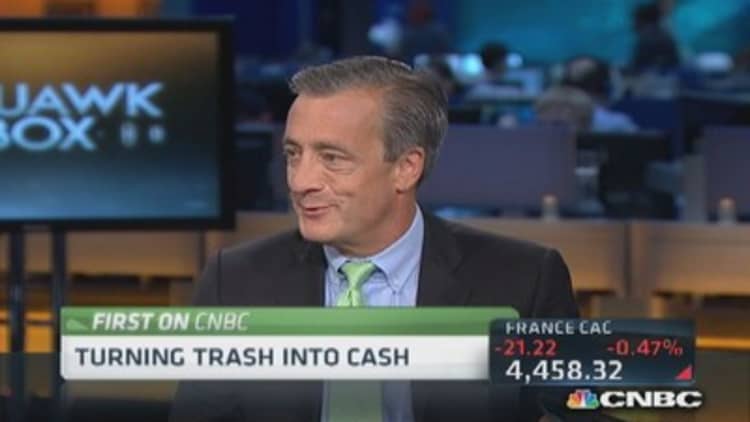Garbage stinks.
But for Waste Management, that rather unpleasant smell is ripe with the opportunity to create renewable energy.
"With garbage, we actually create more energy than the entire solar industry in the United States," CEO David Steiner told CNBC Friday.
Waste Management said it made 9.82 million megawatt hours (mwh) of energy last year. The solar industry generated 9.25 million mwh in 2013, according to the Energy Information Administration.
Waste Management's approach to energy production starts with the decomposition of organic material in hundreds of its landfills across the country.
"What we do is take the methane that's created there—[it's] 22 times worse than carbon dioxide as a greenhouse gas—we capture that methane gas and make energy out of it," Steiner explained in a "Squawk Box" interview.
The other method Waste Management uses involves the conversion of trash to create thermal energy. Its wholly owned subsidiary, Wheelabrator Technologies, owns or operates 17 waste-to-energy plants.
Tracking trash
Besides energy, tracking trash at Waste Management also can provide a glimpse into U.S. economic growth.
"There's always more garbage because the economy is doing better, across a wide variety of spectrums," Steiner said. "I wouldn't call it robust growth, but I'd call it stability with more upside potential than downside potential."

On Thursday, the company announced of 49 cents a share in the first quarter. Revenue of $3.4 billion basically matched Wall Street forecasts.
"Cardboard is our most profitable stream in our recycling," Steiner told CNBC Friday. "When you look at e-commerce, when you look at all commerce…it gets shipped in a box. That box, we recycle it. And it can make another box to bring materials back."
But recycling for the first three months of 2014 dropped 3 percent compared with the year-ago period.
"It's more difficult to make money with lower prices," Steiner explained, "which means we're not going to make as much investment, which means we're not going to be able to do as much recycling."
The name of the game has been controlling margins. "You can get less volume at higher margins. That's what we've been doing the last 10 years. What we call, 'Not getting the most volumes but the best volumes.'"
—By CNBC's Matthew J. Belvedere


